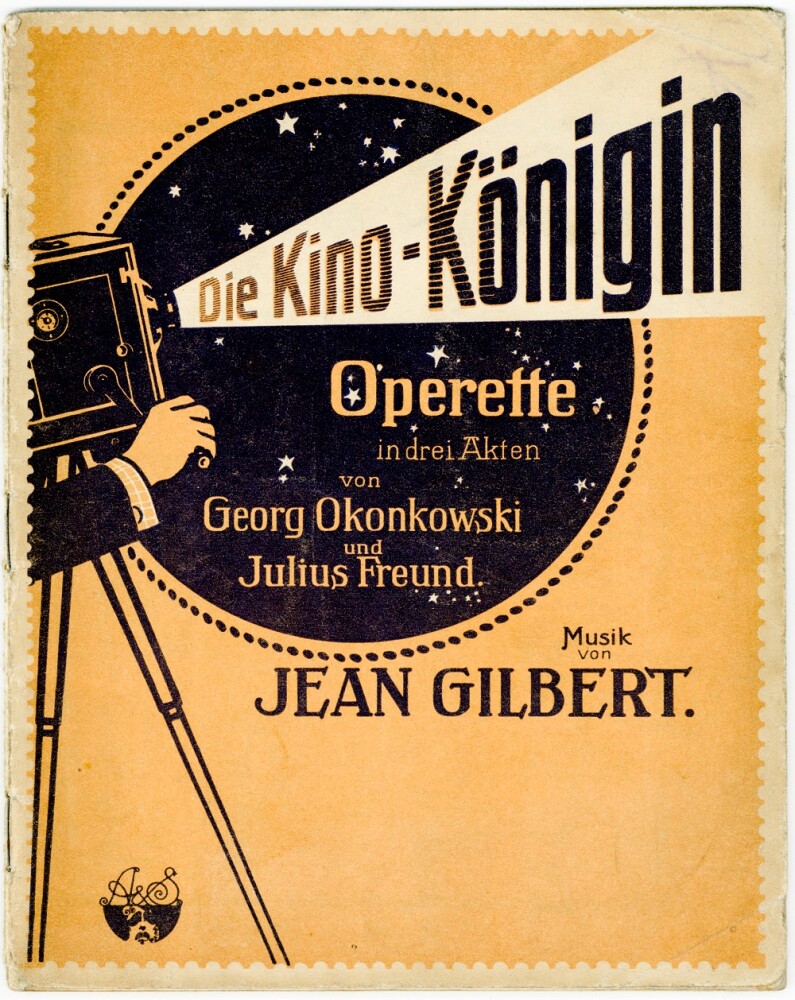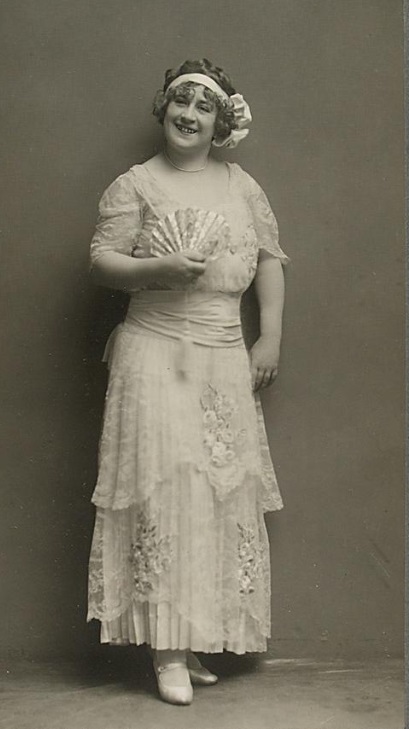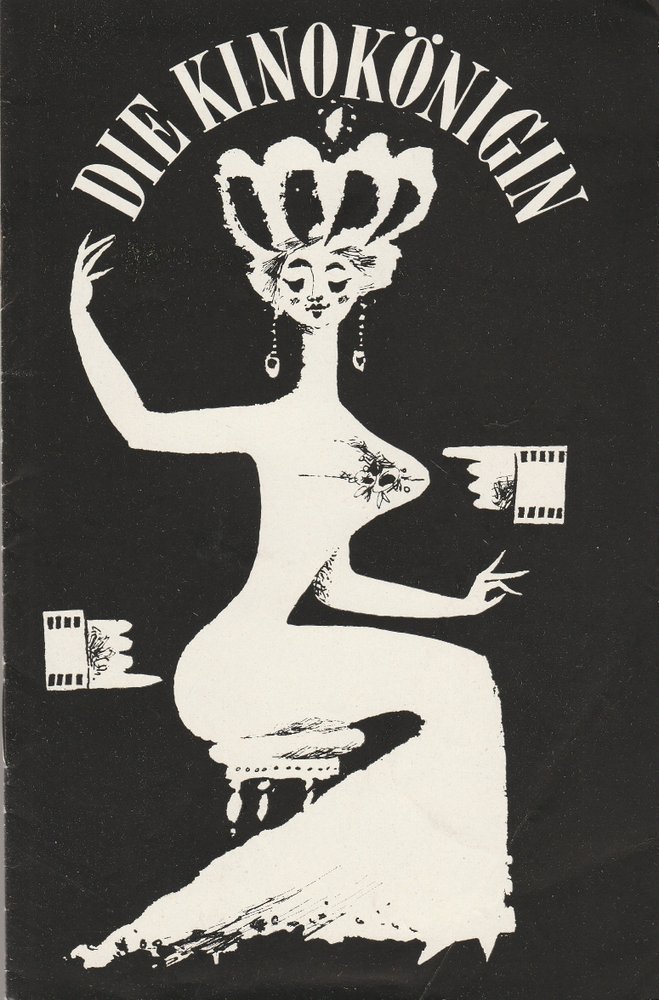Kurt Gänzl
Encyclopedia of the Musical Theatre
10 April, 2022
Jean Gilbert’s operetta with the original libretto by Georg Okonkowski premiered on 22 November 1912 at Deutsches Operettentheater, Hamburg, as Die elfte Muse. It was the reworked by Julius Freund for the Metropoltheater, Berlin, and opened there on 8 March 1913 under its final titel.

The textbook for “Die Kinokönigin”. (Photo: From Evelin Förster’s book “Die Perlen der Cleopatra”, 2022)
The original plot was set in the United States of America: The noble Victor von Gardennes (Karl Bachmann), who moonlights as a clandestine film actor, inadvertently compromises Annie (Helene Ballot), the daughter of Josias Clutterbuck (Guido Thielscher), President of the Temperance League, Vice-President of the Crusade Against Trashy Books, and an anti-cinema advocate, on the day of her wedding to Boppi Lopp (Victor Norbert) and he is thus, by the laws of Operette, obliged to marry her.
The jealous movie star Delia Gill (Ida Russka) tricks old Clutterbuck into being seen with her in public and thus ruins his credibility as a moral crusader, but Victor has a change of heart and he turns things round by announcing that Josias is going to make a useful marriage between morals and movies – he will use film productions to bring poverty and injustice to general notice. And so Victor keeps his little bride, and the slightly slighted Delia has to make do with the arms of a less aristocratic actor.

Scene from the original Berlin production of “Die Kinokönigin” with Karl Bachmann as Victor. (Photo: From Evelin Förster’s book “Die Perlen der Cleopatra”, 2022)
Gilbert’s work came hot on the heels of Walter Kollo’s widely played Filmzauber, the first significant German piece to use the newly popular silent movies and their performers as subject matter. Originally called Die elfte Muse (the eleventh muse … cabaret was supposed to be the tenth!) in its Hamburg production, the Operette was revised by Julius Freund and rechristened with the more commercial title Die Kino-Königin for Berlin where it joined Polnische Wirtschaft, Autoliebchen, Puppchen and Die Reise um die Erde in 40 Tage to establish Gilbert at the forefront of the German musical comedy scene in just a few brief seasons.
Gilbert’s score for Die Kino-Königin was filled with dancing melodies, and one – the march song ‘In der Nacht (wenn die Liebe erwacht)’ – became a major song hit. Amongst the remainder, the Kino-Walzer ‘Man lacht, man lebt, man liebt!’, the heroine’s dance-duet with her ‘victim’, ‘Ach, Amalia!’ and Victor’s lighthearted ‘Liebliche kleine Dingerchen’ topped the musical list, and all gave opportunities for a display of the dance element which was now so liberally emphasized in local musical shows.

The cinema waltz (“Kino Walzer”) from Jean Gilbert’s “Kinokönigin”. (Photo: From Evelin Förster’s book “Die Perlen der Cleopatra”, 2022)
Die Kino-Königin proved a great success far beyond Hamburg. Following its initial season in Berlin it went on to run up a long series of productions in the German provinces where it was subsequently rated second in popularity only to Die keusche Susanne in the long list of Gilbert’s works and, whilst its record overseas was not quite as fine, given that it appeared in time of war, it nevertheless was played widely and well.
In Vienna Mizzi Freihardt (Delia), Paul Harden (Victor) and Oskar Sachs (Josias) played a season at the Établissement Ronacher before the show was moved up to the temporarily at-a-loss Carltheater (2 June 1914), where it soon passed its 100th performance (30 June). It had to be withdrawn when the theatre got a production of its own together, and it moved back to Ronacher, but such was its popularity that the following year, in an almost unprecedented move, Carltheater director Eibenschütz remounted the piece, again directed by Miksa Preger, with the theatre’s own star Mizzi Zwerenz as Delia alongside Richard Waldemar’s Josias. It ran right through the summer and closed after its 286th performance.

Mizzi Zwerenz as Delia in “Die Kinokönigin”. (Photo: Ludwig Gutmann / Theatermuseum Wien)
The wartime playbills credited the music to ‘Max Winterfeld’ but reminded patrons in brackets that he was the same person who once liked to pretend he was the French ‘Jean Gilbert’ in the days when being French was all right. In 1924 Die Kino-Königin was again seen at the Carltheater, with Freihardt and Fritz Imhoff starred.
The first foreign-language version to hit the stage was a French one (adapted by A. de Graef) mounted at the Brussels Scala in 1913 (23 December), but it did not progress to Paris.
There was more success for Thomas Ryley’s American production of The Queen of the Movies (ad Glen MacDonough, Edward Paulton), starring Valli Valli (Delia) and Frank Moulan (Josias) and featuring additional numbers by Leslie Stuart (‘Whistle’) and Irving Berlin (‘Follow the Crowd’), which ran a good 106 nights at the Globe Theater and popularized ‘When the Moon Slyly Winks in the Night’ (‘In der Nacht’) around America, whilst in Britain, Robert Courtneidge’s staging of The Cinema Star (ad Jack Hulbert, Harry Graham) with Dorothy Ward playing the title-rôle alongside Lauri de Frece, Harry Welchman, Cicely Courtneidge and Hulbert, seemed set for a long run, when it was hit by considerations of loyalty (Gilbert was, after all, reported actually to be fighting on the war’s other side) and had to be closed after 109 performances. Courtneidge nevertheless managed to keep his show going on the road, where apparently such considerations of origin counted for less than in London, for four seasons.

Lilli Wünscher as Delia in “Die Kinokönigin” at Musikalische Komödie Lepzig, 2022. (Photo: Tom Schulze)
Australia, similarly, had no foolish qualms about the sources of its entertainment, and The Cinema Star was mounted there in 1916 with Ethel Cadman (singing ‘On the Beach at Waikiki’), Florence Young, Minnie Love (performing Louis Hirsch’s ‘My Radium Girl’ and ‘The Broken Doll’), Reginald Roberts, Derek Hudson and Phil Smith declaring ‘I Want to Go Back to Honolulu’ (Sonny Cunha/William Warren) as Clutterbuck at the head of its cast. A fine eight weeks in Melbourne and six as a Christmas entertainment in Sydney (Her Majesty’s Theatre, 23 December 1916) recompensed a show which did not, by this stage, seem to be very largely Die Kino-Königin, in its music at least.
There was a Berlin revival at the Metropoltheater in 1948, and a fresh German version of the piece, heavily rewritten by Gilbert’s son Robert and Per Schwenzen, and with numbers from other Gilbert shows introduced, was produced at the Opernhaus, Nuremberg in 1961, thus creating a new copyright for the show. This version was played at the Metropoltheater in 1964.

The program book for “Die Kinokönigin” at Metropoltheater Berlin, 1963/64.
The new version moves the US-American story to Berlin, turning Delia into a German film star and making the plot about the suffragette movement in pre-WW1 Germany under Emperor Wilhelm II. The DDR was very interested in ridiculing the former Prussian political system of “Obrigkeitshörigkeit”, showing the morally corruptness of Rüdiger von Perlitz as Culture Minister (formerly Josias Clutterbuck, President of the Temperance League, Vice-President of the Crusade Against Trashy Books and an anti-cinema advocate).
In this version von Perlitz battles against the “new and modern” medium film because he sees it as an assault on the established system of power. Boppi Lopp, his daughter’s finance, is turned into the political activst/journalist Edelhardt von Edelhorst who writes anonymous pamphlets against the Prussian government, WIlhelm II, and his future father-in-law. When von Perlitz’s double morals are exposed by the famous film clip in the finale, von Edelhorst wins and marries Annie (still named Annie). Von Perlitz is forced to leave politics and retire. Making way for the young revolutionaries.
The DDR version was revived by Musikalische Komödie Leipzig in April 2022, directed by Andreas Gergen. Lilli Wünsche played the title role.

Milko Milev (l.) as Rüdiger von Perlitz with Mathias Schlung as police officer Emil in “Die Kinokönigin” at Musikalische Komödie Leipzig, 2022. (Photo: Tom Schulze)
It appears, by the way, that Die elfte Muse was far from being the first movieland musical. I have noticed the title El cinematografo parlante ‘a zarzuela in one act by Diaz and Manuel Mauri’ recorded as having taken to the stage in Spain as early as 1901. Talkies, already!
USA: Globe Theater The Queen of the Movies 12 January 1914; Austria: Ronacher 1 April 1914; UK: Shaftesbury Theatre The Cinema Star 4 June 1914; Hungary: A mozitündér Népopéra 31 October 1914; Australia: Her Majesty’s Theatre, Melbourne The Cinema Star 7 October 1916
